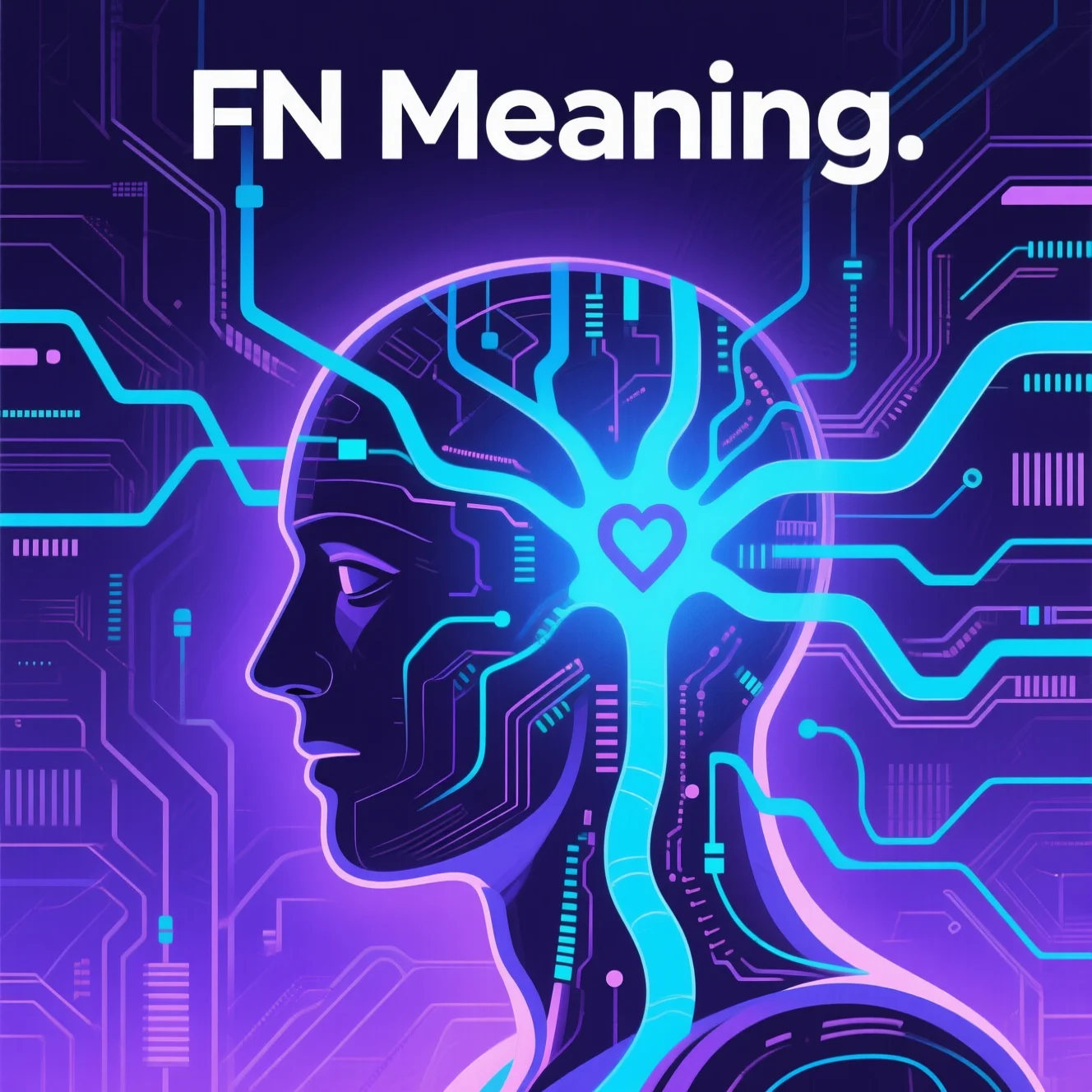The term FN pops up everywhere—text messages, gaming chats, social media, and even casual conversations. But what does it mean? Why is it so popular? Understanding slang like FN helps you stay in the loop, whether you’re gaming online, texting friends, or scrolling through X posts. It’s a quick way to connect and sound in-the-know.
This blog post dives into the meaning of FN, its origins, and how it’s used across different contexts. From gaming lobbies to professional settings, knowing when and how to use FN can make your communication sharper and more relatable. Let’s break it down and explore why this term matters in today’s fast-paced digital world.
Definition & Meaning
FN is a slang term that typically stands for “Fine” or “For Now”, depending on the context. It’s a shorthand way to express agreement, satisfaction, or a temporary state. In some cases, it can also mean “Fing Nice”* in informal or gaming settings, where it’s used to praise something cool or impressive.
- Fine: Used to confirm something is okay or acceptable.
- Example: “Hey, you good with meeting at 7?” “FN, works for me.”
- For Now: Indicates a temporary situation.
- Example: “I’m sticking with this plan FN, but let me know if it changes.”
- Fing Nice*: A casual compliment, often in gaming or social media.
- Example: “That headshot was FN, dude!”
The meaning hinges on tone and context, so it’s key to know where and how it’s being used.
Background & History
The term FN likely emerged from online gaming communities and texting culture in the early 2000s. Abbreviations were born out of the need for speed—typing less while saying more. FN as “Fine” grew from casual chats where people wanted quick ways to agree or confirm. FN as “For Now” came from planning discussions, especially in collaborative games like Fortnite or Call of Duty, where temporary strategies are common. The “Fing Nice”* version gained traction in gaming forums and platforms like Discord, where players hype up cool moves or achievements. Today, FN is widespread on X, TikTok, and gaming platforms, evolving into a versatile term that adapts to the vibe of the conversation.
Usage in Various Contexts
FN’s versatility shines across different settings:
- Texting:
- Friend 1: “Wanna grab pizza later?”
- Friend 2: “FN, I’m down.”
- Social Media (e.g., X posts):
- User: “Just dropped a new track! 🎵 #NewMusic”
- Reply: “Yo, that beat is FN!”
- Gaming:
- Player 1: “I got the sniper spot.”
- Player 2: “FN, hold it down.”
- Casual Conversations:
- Person A: “Is this outfit cool for the party?”
- Person B: “FN, you look great.”
Each context tweaks the tone, but FN stays short, snappy, and effective.
Common Misconceptions & Clarifications
Some think FN always means “Fing Nice”, which can lead to awkward mix-ups in polite settings. For example, using FN in a professional email might confuse someone expecting “Fine”. It’s not inherently offensive, but the “Fing Nice”** version can be inappropriate in formal contexts. Another misconception is that FN is universal—it’s not. Some cultures or age groups might not recognize it, assuming it’s a typo or niche slang. Always consider your audience before using it to avoid confusion or unintended offense.
Similar Terms & Alternatives
FN shares space with other slang terms like:
- OK: Simple agreement, less casual than FN.
- Cool: Similar vibe but less specific.
- Bet: Shows agreement or enthusiasm, common in Gen Z slang.
- Aight: A casual version of “alright.”
| Term | Meaning | Tone | Example |
|---|---|---|---|
| FN | Fine/For Now | Casual, quick | “FN, let’s do it.” |
| OK | Okay | Neutral | “OK, sounds good.” |
| Bet | Agreement | Confident, trendy | “Bet, I’m there.” |
| Cool | Approval | Relaxed | “Cool, see you later.” |
How to Respond to This Term
Responding to FN depends on the vibe you’re going for:
- Casual: “Sweet, FN by me too.”
- Funny: “FN? More like Freakin’ Nailed it!”
- Professional: “Understood, that works.”
- Privacy-Conscious: “Got it, let’s keep it FN for now.”
Example:
- Friend: “FN if we meet at 8?”
- You (Casual): “FN, see you then.”
- You (Funny): “FN? Bro, that’s Freakin’ Nasty timing, but I’m in!”
Match the tone to keep the conversation flowing.
Regional or Cultural Differences
FN is mostly used in English-speaking regions, especially in the U.S., U.K., and Australia. In non-English-speaking countries, it’s less common unless gaming or social media culture is strong. For example, in Spanish-speaking gaming communities, you might see “BN” (Bueno) instead. In the U.K., “Fine” is sometimes replaced with “Alright” or “Ace”. Cultural differences also affect tone—“Fing Nice”* might be too bold in conservative settings, like parts of Asia or formal European circles. Always gauge the cultural context before dropping FN.
Comparison with Similar Terms
Here’s how FN stacks up:
| Term | Context | Vibe | Flexibility |
|---|---|---|---|
| FN | Texting, gaming | Casual, edgy | High (multiple meanings) |
| OK | Universal | Neutral | Low (very formal) |
| Bet | Social media, youth | Confident | Medium (slang-heavy) |
| Cool | Everyday | Chill | High (broad use) |
FN’s edge comes from its adaptability, but it’s less formal than OK and less trendy than Bet.
Usage in Online Communities & Dating Apps
On platforms like X, FN is a quick way to hype posts or agree with plans. In gaming communities (e.g., Fortnite, Valorant), it’s a go-to for praising skills or confirming strategies. On Tinder, FN can add a playful vibe:
- Match: “You free tonight?”
- You: “FN, what’s the plan?” Tips for responding:
- Keep it light and match their energy.
- Avoid overusing FN—it can sound forced.
- On dating apps, pair it with emojis for extra flair: “FN 😎.”
Hidden or Offensive Meanings
While FN is usually harmless, “Fing Nice”* can offend in formal or sensitive settings. Context matters—saying FN in a heated gaming session is fine, but using it in a work email could seem unprofessional. Some might misread FN as an abbreviation for something crude or unrelated (e.g., a brand or acronym). Always clarify the intent if the conversation feels off.
Suitability for Professional Communication
FN is not suitable for formal settings like emails or meetings. It’s too casual and risks being misread. Instead, use:
- “Fine”: “That time works fine for me.”
- “Confirmed”: “I’ve confirmed the details.”
- “Agreed”: “I agree with the plan.” Stick to these for clarity and professionalism.
FAQs
- What does FN mean in texting?
It usually means “Fine” or “For Now,” but can mean “F***ing Nice” in casual settings. - Is FN offensive?
Not usually, but “F***ing Nice” can be inappropriate in formal contexts. - Where did FN come from?
It started in gaming and texting culture for quick communication. - Can I use FN in professional emails?
No, use formal terms like “Fine” or “Confirmed.” - Is FN used globally?
Mostly in English-speaking regions, less common elsewhere. - What’s a good response to FN?
Match the tone: “Cool,” “Bet,” or “Sounds good.” - Does FN have other meanings?
Rarely, it might refer to brands or acronyms, but context usually clarifies.
Conclusion
FN is a versatile, trendy slang term that fits perfectly in casual texting, gaming, and social media. Whether it means “Fine”, “For Now”, or “Fing Nice”*, its meaning depends on context. From its roots in online culture to its use on platforms like X and Tinder, FN keeps conversations quick and lively. Just be mindful of where you use it—stick to casual settings and avoid professional ones. With this guide, you’re ready to use FN confidently and respond like a pro.



